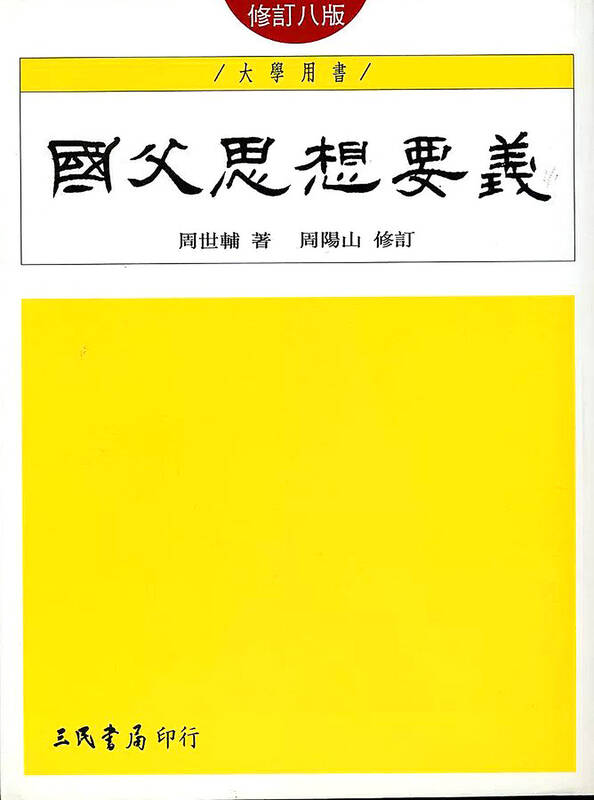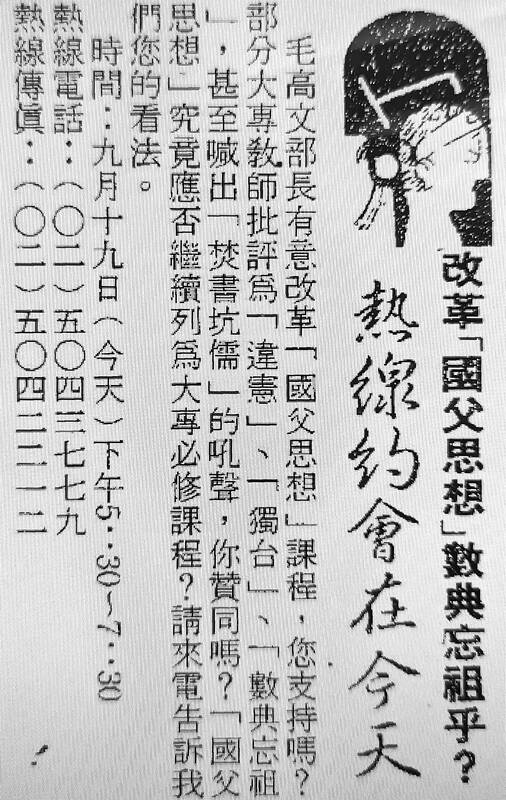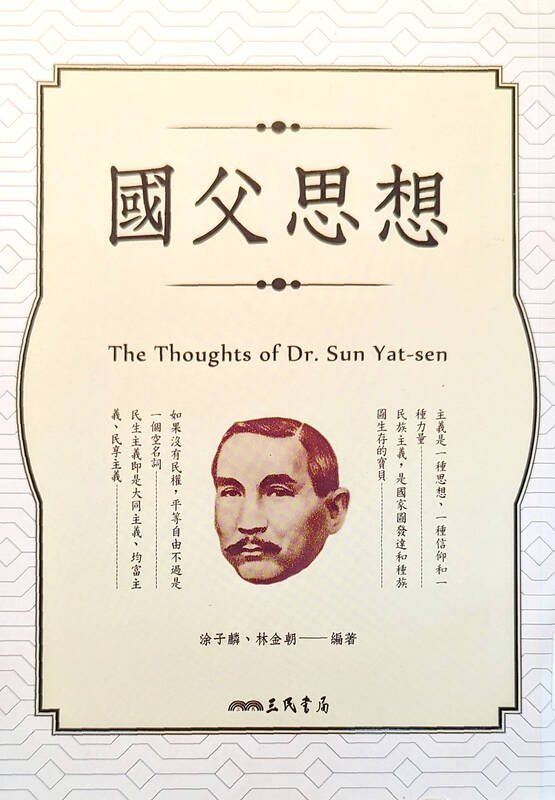For more than four decades, all students in Taiwan, up to the university level, were mandated to take “Sun Yat-sen Thought” (國父思想) classes. Based on the Republic of China founder’s Three Principles of the People political ideology, they also contained anti-communist sentiments and patriotic Chinese Nationalist Party (KMT) propaganda.
After the lifting of martial law in 1987, students began calling for more academic freedom and for schools to be free of government interference. On Sept. 19, 1990, representatives from eight departments at National Taiwan University (NTU) released a joint statement asking the Department of Education to make the course an elective instead. They also announced that they were urging first-year students to either drop the course or refuse to take it.
This announcement came after the government decided to simply rename the class “The ROC Constitution and Founding Spirit” (憲法與立國精神) without changing the contents or its compulsory status.

Photo courtesy of Books.com.tw
“This decision not only fails to facilitate the liberalization and modernization of higher education, it will not even help promote national solidarity,” the statement read. “In reality, it will only stifle the ability of our youth to think creatively and develop their wisdom.”
In response, the KMT central committee argued that the Three Principles is “a visionary ideology that’s still very applicable to modern times, as evidenced by its successful implementation in Taiwan. If teaching it has been beneficial to our nation for the past 40 years, then why is there a need to change the name of the course and make it an elective?”
“Instead, our focus should be on how to improve the teaching of the class.”

Photo: File
The students’ bid failed, but they eventually got their way in 1995 after the Council of Grand Justices deemed it unconstitutional to force universities to make any class mandatory. The subject remained in the college entrance exams, however.
PARTY EDUCATION
After reunifying China by vanquishing the northern warlords in 1928, the KMT announced that “party principles” would become a regular part of China’s university curriculum. The class was later renamed “Three Principles of the People” and made compulsory for all students in 1944. This was not without controversy, as many educators, such as future NTU president Fu Ssu-nien (傅斯年) criticized the move as a violation academic freedom.

Photo courtesy of National Central Library
According to the study, “A disappearing ideology — The propagation of the Three Principles of the People in Taiwan as an example” (一個消失中的意識型態 — 以三民主義在台灣的傳播為例) by Wu Ju-chia (吳儒佳), after retreating to Taiwan, KMT leader Chiang Kai-shek (蔣介石) believed that one reason they lost the Chinese Civil War was because they didn’t properly implement Three Principles of the People education.
In 1950, the government decreed that it be taught at all levels of education. The classes carried strong anti-communist overtones and became even more ideological, Wu writes. The Three Principles were touted as the only way to save the nation and retake China. In 1964, the university-level classes were renamed “Sun Yat-sen Thought.”
Chen Yan-hui (陳延輝) writes in “Reviewing 50 years of political ideology education in Taiwan” (台灣五十年來政治思想教育的檢討) that these classes “remained in the past and focused on a illusory China that no longer existed, completely ignoring the political reality of Taiwan.” In 1984, the classes began emphasizing the success of the Three Principles in Taiwan to legitimize KMT rule as opposition voices grew.
ACADEMIC FREEDOM
Voices criticizing party interference in higher education grew after the lifting of Martial Law in 1987, culminating in the September 1990 declaration by NTU students. The United Daily News (聯合報) interviewed students from different universities on their opinion, many of whom said that the content had long strayed from Sun’s original intentions and had become rife with propaganda and misinterpretations by later scholars.
Furthermore, the KMT was no longer the only political party, and was losing the authority to dominate school curricula. Even those who supported Sun’s ideals worried that by forcing it on students, it would create the opposite effect and brew resentment.
However, due to strong opposition by governmental bigwigs, Minister of Education Mao Kao-wen (毛高文) refrained from making any moves.
Many welcomed the debate anyway. Newspaper editor Chang Tso-chin (張作錦) writes in a Global Views Monthly (遠見) article: “Who would dare even bring this up two or three years ago? Now we can discuss it openly, and either support or be against it without suffering any negative consequences.”
Chang actually supported and admired the Three Principles, but he blamed the KMT for using Sun’s name and his ideals to maintain their authoritarian rule. Because the KMT “only allowed people to worship the principles and not discuss them,” once their one-party rule ended, it was only natural that the principles would quickly lose their relevance.
Lee Yuan-tse (李遠哲), who headed the Executive Yuan’s educational reform review committee, argued that one could finish reading the material on Sun Yat-sen Thought in three hours and there was no need to spend so much time on the subject.
UNCONSTITUTIONAL
In 1995, the Council of Grand Justices ruled in Interpretation 380 that it was unconstitutional to make Sun Yat-sen Thought mandatory in universities. They cited article 1 of the University Act, which stated that “Universities shall be guaranteed academic freedom and shall enjoy autonomy within the scope of laws and regulations.”
Since there was no law stipulating that the schools make any class compulsory, each institution should be allowed to make their own decisions.
The next step was to remove the subject from the university entrance exams. A committee had been formed to investigate this in December 1994, and in a survey of 35 universities in 1996, 28 supported removing the subject.
The Department of Education opted to leave it on the exams, leading Tsing Hua University president Shen Chun-shan (沈君山) to say, “To respect Sun Yat-sen doesn’t mean that his ideals should be on the exams. Given the questions offered in the exam today, I doubt that even Sun would be able to pass.” This showed how far the subject had strayed from Sun’s original ideals under KMT manipulation, Wu writes.
The debate came to an impasse in 1995, and a compromise was made to reduce the percentage of the subject in the exam by half. It was only fully abolished in 1999 for the 2000 school year, the same year that the presidential election saw the end of more than 50 years of KMT rule in Taiwan.
Taiwan in Time, a column about Taiwan’s history that is published every Sunday, spotlights important or interesting events around the nation that either have anniversaries this week or are tied to current events.

Jacques Poissant’s suffering stopped the day he asked his daughter if it would be “cowardly to ask to be helped to die.” The retired Canadian insurance adviser was 93, and “was wasting away” after a long battle with prostate cancer. “He no longer had any zest for life,” Josee Poissant said. Last year her mother made the same choice at 96 when she realized she would not be getting out of hospital. She died surrounded by her children and their partners listening to the music she loved. “She was at peace. She sang until she went to sleep.” Josee Poissant remembers it as a beautiful

Before the last section of the round-the-island railway was electrified, one old blue train still chugged back and forth between Pingtung County’s Fangliao (枋寮) and Taitung (台東) stations once a day. It was so slow, was so hot (it had no air conditioning) and covered such a short distance, that the low fare still failed to attract many riders. This relic of the past was finally retired when the South Link Line was fully electrified on Dec. 23, 2020. A wave of nostalgia surrounded the termination of the Ordinary Train service, as these train carriages had been in use for decades

Lori Sepich smoked for years and sometimes skipped taking her blood pressure medicine. But she never thought she’d have a heart attack. The possibility “just wasn’t registering with me,” said the 64-year-old from Memphis, Tennessee, who suffered two of them 13 years apart. She’s far from alone. More than 60 million women in the US live with cardiovascular disease, which includes heart disease as well as stroke, heart failure and atrial fibrillation. And despite the myth that heart attacks mostly strike men, women are vulnerable too. Overall in the US, 1 in 5 women dies of cardiovascular disease each year, 37,000 of them

March 2 to March 8 Gunfire rang out along the shore of the frontline island of Lieyu (烈嶼) on a foggy afternoon on March 7, 1987. By the time it was over, about 20 unarmed Vietnamese refugees — men, women, elderly and children — were dead. They were hastily buried, followed by decades of silence. Months later, opposition politicians and journalists tried to uncover what had happened, but conflicting accounts only deepened the confusion. One version suggested that government troops had mistakenly killed their own operatives attempting to return home from Vietnam. The military maintained that the